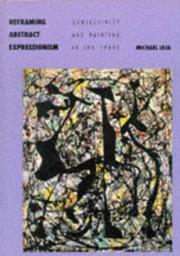Check nearby libraries
Buy this book

In the wake of World War II, the paintings of Jackson Pollock, Mark Rothko, Barnett Newman, Willem de Kooning, and other New York School artists participated in a culture-wide initiative to reimagine the self. At a time when widely held beliefs about human nature and the human condition were coming to seem to many commentators increasingly outdated and inadequate, Abstract Expressionism gave compelling visual form to a new subjectivity - a new experience and idea of self. In this original and wide-ranging study, Michael Leja argues that the interest of these artists in tapping "primitive" and "unconscious" components of self aligns them with many contemporary essayists, Hollywood filmmakers, journalists, and popular philosophers who were turning, like the artists, to psychology, anthropology, and philosophy in the effort to reformulate individual identity. Taking Pollock's paintings and their reception as a case study, Leja shows that critics located in Pollock's abstract forms a web of metaphors - including spatial entrapment, conflicted production, energy flow, gendered opposition, and unconsciousness - that situated the paintings in mainstream cultural discourses on the individual's sense of self and identity. In this interpretative frame, the cultural and ideological character of the art is illuminated. According to Leja, Abstract Expressionism effectively enacted and represented the new, conflicted, layered subjectivity, a feature that helps to account for the support and interest it garnered from cultural and political institutions alike.
In the wake of World War II, the paintings of Jackson Pollock, Mark Rothko, Barnett Newman, Willem de Kooning, and other New York School artists participated in a culture-wide initiative to reimagine the self. At a time when widely held beliefs about human nature and the human condition were coming to seem to many commentators increasingly outdated and inadequate, Abstract Expressionism gave compelling visual form to a new subjectivity - a new experience and idea of self.
In this original and wide-ranging study, Michael Leja argues that the interest of these artists in tapping "primitive" and "unconscious" components of self aligns them with many contemporary essayists, Hollywood filmmakers, journalists, and popular philosophers who were turning, like the artists, to psychology, anthropology, and philosophy in the effort to reformulate individual identity. Taking Pollock's paintings and their reception as a case study, Leja shows that critics located in Pollock's abstract forms a web of metaphors - including spatial entrapment, conflicted production, energy flow, gendered opposition, and unconsciousness - that situated the paintings in mainstream cultural discourses on the individual's sense of self and identity. In this interpretative frame, the cultural and ideological character of the art is illuminated.
According to Leja, Abstract Expressionism effectively enacted and represented the new, conflicted, layered subjectivity, a feature that helps to account for the support and interest it garnered from cultural and political institutions alike.
Check nearby libraries
Buy this book

Previews available in: English
Subjects
Criticism and interpretation, Abstract expressionism, Subjectivity in art, American Painting, Painting, history, Pollock, jackson, 1912-1956, Painting, modern, 20th century, Expressionnisme abstrait, Peinture, Abstract expressionisme, Critique et interprétation, Subjectivité, Dans l'artPeople
Jackson Pollock (1912-1956)Places
United StatesTimes
20th centuryShowing 2 featured editions. View all 2 editions?
| Edition | Availability |
|---|---|
|
1
Reframing Abstract Expressionism: Subjectivity and Painting in the 1940s
February 27, 1997, Yale University Press
Paperback
in English
- New Ed edition
0300070829 9780300070828
|
zzzz
Libraries near you:
WorldCat
|
|
2
Reframing abstract expressionism: subjectivity and painting in the 1940s
1993, Yale University Press
in English
0300044615 9780300044614
|
aaaa
Libraries near you:
WorldCat
|
Book Details
Edition Notes
Includes bibliographical references (p. [370]-388) and index.
Classifications
The Physical Object
ID Numbers
Community Reviews (0)
Feedback?| July 23, 2024 | Edited by MARC Bot | import existing book |
| March 21, 2022 | Edited by ImportBot | import existing book |
| August 18, 2020 | Edited by ImportBot | import existing book |
| August 4, 2020 | Edited by ImportBot | import existing book |
| December 10, 2009 | Created by WorkBot | add works page |











